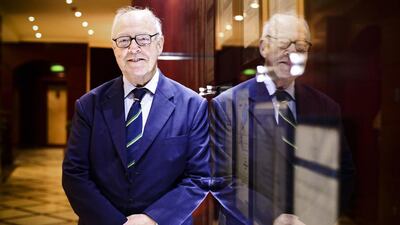ABU DHABI // New generations of nuclear power plants will not lead to disastrous accidents like the one in Fukushima, Japan, the chairman of the UAE’s nuclear programme advisory board has said.
Dr Hans Blix, former head of the International Atomic Energy Agency, said on Tuesday that smaller accidents might happen but that faith in the sustainable energy source was slowly being restored around the world.
“The Fukushima plants were 40 years old,” he said during the lecture organised by the Khalifa University on the importance of nuclear power to states and the world, at the Emirates Centre for Strategic Studies and Research.
“They were not the new generation and there were errors in the past, including a lack of sufficient strength in the attitude of the regulator vis-a-vis the operator, and there were also weaknesses in the technical side in the placement of these generators.”
He said there were still concerns about nuclear power.
“Nuclear can offer huge amounts of power without emitting any carbon dioxide,” he said. “It’s the only fuel that can offer energy in terawatt volumes without emitting [carbon dioxide]. Nuclear power is a sustainable source of energy, it’s not a renewable source of energy, and we need sustainable energy.”
The most common concern revolves around nuclear safety.
“There have been three major accidents in the world and they all involved core melts,” said Dr Blix. “We cannot guarantee there won’t be more. The risk is never zero but it is very low, and I think we can exclude the big accidents, not the smaller ones.”
He said many 40-year-old reactors, in France for instance, would soon be replaced.
“In the third generation of nuclear power plants coming on stream, we can be sure that even in serious accidents, there will not be any spills of radiation in the environment,” he said.
“The fourth generation of plants, which is now on the drawing board and in the phase of design, can also [rule out] the risk of any core melts. The most severe modern energy-related accidents were connected with hydro-dams bursting.”
He said that although no generation of energy was without some dangers to the environment and the population, hazardous radioactive contamination had been a particular negative consequence of accidents such as Chernobyl and Fukushima. “And this is bad,” he said. “Yet we should note that with the third and fourth generation of nuclear power plants, there should be no risk of contamination from accidents.”
Dr Blix said consensus could not be reached on the use of nuclear power. “And this must not stand in the way of the use of expanded nuclear power in countries where they accept it,” he said. “For those countries, it is crucial to use this energy.”
In the Middle East, the support was strong, he said.
“The UAE, Saudi Arabia and Iran are determined to rely on it to generate much of the electricity they need and perhaps to desalinate water,” he said. “The four nuclear power plants in the UAE add 5.6 gigawatt of electricity to the country’s present fossil fuel base capacity of 19 gigawatt. So far, work has been on schedule and on budget, and it’s an achievement.”
He called the UAE programme a well-prepared and ambitious project.
“It will result in a large energy capacity serving the UAE society and industry,” he said. “Women also form a significant part of the workforce. The project has been set as the gold standard and that has been well earned.”
The UAE aims to have four nuclear plants operational by 2020 to provide energy that is expected to meet up to a quarter of electricity needs and save up to 12 million tonnes of greenhouse gas emissions a year.
cmalek@thenational.ae

